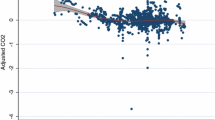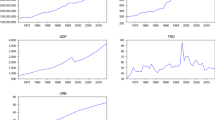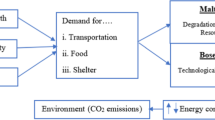Abstract
The pace of urbanisation, the intensity of energy consumption, and the quality of environmental regulation level pose a severe threat to environmental sustainability in Africa. Hence, we examine the role of regulatory quality on environmental pollution through urbanisation and energy consumption channel in 33 African nations between 1996 and 2020. Our study considers cross sectional dependence in Africa; as a result, we employ the Augmented Mean Group method and Common Correlated Effect Mean Group for a robustness check to analyse the panel series. The study finds that (i) urbanisation increases environmental pollution, (ii) energy consumption accelerates environmental degradation, (iii) regulatory quality can partially mediate pollution in Africa via urbanisation and energy consumption channels, and (iv) the interaction of regulatory quality with urbanisation and energy consumption, respectively, reduce environmental pollution establishing a moderation effect. The study suggests that African countries tighten environmental regulatory policies to lessen carbon emissions and drive environmental sustainability towards achieving carbon neutrality by 2050.
Similar content being viewed by others
Notes
List of countries.
Angola, Algeria, Benin, Botswana, Cameroon, Congo Democratic Republic, Chad, Cote d'Ivoire, Congo Republic, Egypt, Gabon, Ethiopia, Ghana, Gambia, Guinea Bissau, Guinea, Libya, Mauritius, Mauritania, Mali, Morocco, Mozambique, Rwanda, Namibia, Nigeria, Niger, Senegal, South Africa, Tanzania, Tunisia, Togo, Zambia, Zimbabwe.
References
Adams S, Klobodu EKM (2017) Urbanisation, democracy, bureaucratic quality, and environmental degradation. J Policy Model 39(6):1035–1051
Adams S, Boateng E, Acheampong AO (2020) Transport energy consumption and environmental quality: Does urbanisation matter? Sci Total Environ 744:140617
Afolabi JA (2023) Natural resource rent and environmental quality nexus in Sub-Saharan Africa: assessing the role of regulatory quality. Resour Policy 82:103488
Akorli CD, Adom PK (2023) The role of corruption control and regulatory quality in energy efficiency transition tendencies in Africa. Iscience 26(3):1–25
Alberts EC (2022) ollution is the 'largest existential threat' to humans, killing 9 million each year. https://www.weforum.org/agenda/2022/05/pollution-largest-existential-threat-humans-9-million-deaths/. Accessed 15 Sep 2022
Al-Mulali U, Ozturk I (2015) The effect of energy consumption, urbanisation, trade openness, industrial output, and the political stability on the environmental degradation in the MENA (Middle East and North African) region. Energy 84:382–389
Al-Saidi M (2020) Instruments of energy subsidy reforms in Arab countries—the case of the Gulf Cooperation Council (GCC) countries. Energy Rep 6:68–73
Aluko OA, Obalade AA (2020) Financial development and environmental quality in sub-Saharan Africa: Is there a technology effect? Sci Total Environ 747:141515
Andreoni J, Levinson A (2001) The simple analytics of the environmental Kuznets curve. J Public Econ 80(2):269–286
Armeanu DS, Joldes CC, Gherghina SC, Andrei JV (2021) Understanding the multidimensional linkages among renewable energy, pollution, economic growth and urbanisation in contemporary economies: quantitative assessments across different income countries’ groups. Renew Sustain Energy Rev 142:110818
Avom D, Nkengfack H, Fotio HK, Totouom A (2020) ICT and environmental quality in Sub-Saharan Africa: effects and transmission channels. Technol Forecast Soc Chang 155:120028
Bastola U, Sapkota P (2015) Relationships among energy consumption, pollution emission, and economic growth in Nepal. Energy 80:254–262
Behera SR, Dash DP (2017) The effect of urbanisation, energy consumption, and foreign direct investment on the carbon dioxide emission in the SSEA (South and Southeast Asian) region. Renew Sustain Energy Rev 70:96–106
Bello MO, Solarin SA, Yen YY (2018) The impact of electricity consumption on CO2 emission, carbon footprint, water footprint and ecological footprint: the role of hydropower in an emerging economy. J Environ Manag 219:218–230
Chibuisi CO (2019) Energy efficiency. GSJ 7(4):763–775
Danish RU, Khan SUD, Baloch MA, Li N (2019) Mitigation pathways toward sustainable development: Is there any trade-off between environmental regulation and carbon emissions reduction? Sustain Dev 28(4):813–822
Department of Minerals and Energy Report (2008) National energy efficiency strategy (NEES) framework for Republic of South Africa. https://www.gov.za/sites/default/files/gcis_document/201409/32342908.pdf. Visited 17 Aug 2023
Destek MA, Sarkodie SA (2019) Investigation of environmental Kuznets curve for ecological footprint: the role of energy and financial development. Sci Total Environ 650:2483–2489
Dimnwobi SK, Ekesiobi C, Madichie CV, Asongu SA (2021) Population dynamics and environmental quality in Africa. Sci Total Environ 797:149172
Dogan E, Seker F (2016) An investigation on the determinants of carbon emissions for OECD countries: empirical evidence from panel models robust to heterogeneity and cross-sectional dependence. Environ Sci Pollut Res 23(14):14646–14655
Dong F, Bian Z, Yu B, Wang Y, Zhang S, Li J, Long R (2018) Can land urbanisation help to achieve CO2 intensity reduction target or hinder it? Evidence from China. Resour, Conserv Recycl 134:206–215
Eberhardt M, Teal F (2010) Productivity analysis in global manufacturing production (No. 515)
Effiong EL (2018) On the urbanisation-pollution nexus in Africa: a semiparametric analysis. Qual Quant 52(1):445–456
African Energy Commission (2023) African energy efficiency programme, https://au-afrec.org/energy-efficiency-programme. Visited 17 Aug 2023
Energy Regulation Document (2016) Legal notice 125—The energy (Appliances' Energy Performance and Labelling) regulations 2016. https://www.epra.go.ke/download/the-energy-appliances-energy-performance-and-labelling-regulations-2016/. Visited 16 Aug 2023
Evans O, Mesagan EP (2022) ICT-trade and pollution in Africa: Do governance and regulation matter? J Policy Model 44(3):511–531
Dimnwobi SK, Onuoha CF, Uzoechina BI, Ekesiobi C, Nwokoye ES (2022) Does public capital expenditure reduce energy poverty? Evidence from Nigeria, Working Papers of the African Governance and Development Institute. 22/30, African Governance and Development Institute
GlobalEconomy (2022) Regulatory quality—Country rankings, https://www.theglobaleconomy.com/rankings/wb_regulatory_quality/Africa/. Accessed 15 Aug 2023
Goel RK, Herrala R, Mazhar U (2013) Institutional quality and environmental pollution: MENA countries versus the rest of the world. Econ Syst 37(4):508–521
Hanif I (2018) Impact of economic growth, nonrenewable and renewable energy consumption, and urbanisation on carbon emissions in Sub-Saharan Africa. Environ Sci Pollut Res 25(15):15057–15067
Hanna GB (2015) Energy efficiency building codes and green pyramid rating system. In: Renewable Energy in the Service of Mankind Vol I: Selected Topics from the World Renewable Energy Congress WREC 2014 (pp 597–608). Cham: Springer International Publishing
Khan MK, Teng JZ, Khan MI, Khan MO (2019) Impact of globalisation, economic factors and energy consumption on CO2 emissions in Pakistan. Sci Total Environ 688:424–436
Lee JW (2018) Long-run dynamics of renewable energy consumption on carbon emissions and economic growth in the European Union. Int J Sust Dev World 26(1):69–78
Maduka AC, Ogwu SO, Ekesiobi CS (2022) Assessing the moderating effect of institutional quality on economic growth—carbon emission nexus in Nigeria. Environ Sci Pollut Res. https://doi.org/10.1007/s11356-022-20346-3
Maduka AC, Akunna N, Ekesiobi CS., Okafor SN, Chukwuemeka DE (2021) Modelling environment-economic progress nexus for improved quality of life in Nigeria: a test of the green solow model. Paper presented at the 14th Conference of the Nigerian Association of Energy Economics, Themed: Strategic Responses of the Energy Sector to COVID-19 Impacts on African Economies, July 25–28, 2021 at the PTDF Building, Abuja, Nigeria
Maji IK, Sulaiman C, Abdul-Rahim AS (2019) Renewable energy consumption and economic growth nexus: a fresh evidence from West Africa. Energy Rep 5:384–392
Mesagan EP, Olunkwa CN (2022) Heterogeneous analysis of energy consumption, financial development, and pollution in Africa: the relevance of regulatory quality. Utilit Policy 74:101328
Mesagan EP, Ajide KB, Vo XV (2020) Dynamic heterogeneous analysis of pollution reduction in SANEM countries: lessons from the energy-investment interaction. Environ Sci Pollut Res 28(5):5417–5429
Mesagan EP, Akinsola F, Akinsola M, Emmanuel PM (2021) Pollution control in Africa: the interplay between financial integration and industrialisation. Environ Sci Pollut Res, pp 1–11
Mignamissi D, Djeufack A (2021) Urbanisation and CO2 emissions intensity in Africa. J Environ Plann Manag, pp 1–25
Nathaniel S, Aguegboh E, Iheonu C, Sharma G, Shah M (2020a) Energy consumption, FDI, and urbanisation linkage in coastal Mediterranean countries: re-assessing the pollution haven hypothesis. Environ Sci Pollut Res 27(28):35474–35487
Nathaniel S, Anyanwu O, Shah M (2020b) Renewable energy, urbanisation, and ecological footprint in the Middle East and North Africa region. Environ Sci Pollut Res 27(13):14601–14613
Nnodim, C (2023) Monthly fuel consumption drops by 18.5 million litres after deregulation—FG. https://punchng.com/monthly-fuel-consumption-drops-by-18-5million-litres-after-deregulation-fg/. Visited 17 Aug 2023
OECD (2020) Africa's urbanisation dynamics 2020. https://www.oecd.org/development/africa-s-urbanisation-dynamics-2020-b6bccb81-en.htm. Retrieved 4 May 2023
Okafor SN, Ekesiobi C, Ifebi O, Dimnwobi SK, Asongu SA (2022) Testing the triple deficit hypothesis for sub-Saharan Africa: implications for the African continental free trade area. Afr Dev Rev 34(1):142–153
Pesaran MH (2006) Estimation and inference in large heterogeneous panels with a multifactor error structure. Econometrica 74(4):967–1012
Pesaran MH, Shin Y, Smith RP (1999) Pooled mean group estimation of dynamic heterogeneous panels. J Am Stat Assoc 94(446):621–634
Rahman MM, Alam K (2021) Clean energy, population density, urbanisation and environmental pollution nexus: evidence from Bangladesh. Renew Energy 172:1063–1072
Freehill Report (2021) Africa's Journey to COP26, https://www.herbertsmithfreehills.com/insight/africas-journey-to-cop26. Visited 18 Aug 2023
Salahuddin M, Ali M, Vink N, Gow J (2018) The effects of urbanisation and globalisation on CO2 emissions: evidence from the Sub-Saharan Africa (SSA) countries. Environ Sci Pollut Res 26(3):2699–2709
Samimi AJ, Ahmadpour M, Ghaderi S (2012) Governance and environmental degradation in MENA region. Proc Soc Behav Sci 62:503–507
Sharma R, Shahbaz M, Kautish P, Vo XV (2021) Does energy consumption reinforce environmental pollution? Evidence from emerging Asian economies. J Environ Manag 297:113272
Shi J, Liu Y, Sadowski BM, Alemzero D, Dou S, Sun H, Naseem S (2023) The role of economic growth and governance on mineral rents in main critical minerals countries. Resour Policy 83:103718
Solarin SA, Al-Mulali U, Gan GGG, Shahbaz M (2018) The impact of biomass energy consumption on pollution: evidence from 80 developed and developing countries. Environ Sci Pollut Res 25(23):22641–22657
Twerefou DK, Akpalu W, Mensah ACE (2019) Trade-induced environmental quality: the role of factor endowment and environmental regulation in Africa. Climate Dev 11(9):786–798
United Nations Economic Commission for Africa (2021) Urbanisation and inclusive economic growth in Africa. https://www.uneca.org/sites/default/files/IDEP/Courses/Brochure-URBANIZATION-AND-INCLUSIVE-ECONOMIC-GROWTH-IN-AFRICA-ANG.pdf. Accessed 5 May 2023
United Nations (2020) Climate action. https://www.un.org/en/climatechange. Accessed 15 Sep 2022
Whitley S, Van der Burg L (2015) Fossil fuel subsidy reform in sub-Saharan Africa: from rhetoric to reality. Overseas Development Institute. http://newclimateeconomy.report/2015/wp-content/uploads/sites/3/2015/11/FFS-Reform-in-Africa_NCE-ODI_final.pdf. Visited 16 Aug 2023
World Bank (2010) Egypt: improve energy efficiency. https://documents1.worldbank.org/curated/en/570371468028445468/pdf/693100ESW0P1210WB0EE0September02010.pdf. Visited 16 August 2023
World Bank (2022) World development indicators. World Bank
World Health Organization (2022) Air pollution. https://www.who.int/health-topics/air-pollution#tab=tab_1. Accessed 15 Sep 2022
Funding
There is no funding received for this study.
Author information
Authors and Affiliations
Contributions
IB conceptualised the study and wrote the introduction sections. CE presented the literature review (empirical review section), discussed the result and wrote the conclusion. Finally, PME presented the methodology, gathered data, and analysed and interpreted the results. All authors read and approved the final manuscript.
Corresponding author
Ethics declarations
Conflict of interest
The Authors do not have any form of competing interest.
Ethical approval
Not applicable.
Additional information
Publisher's Note
Springer Nature remains neutral with regard to jurisdictional claims in published maps and institutional affiliations.
Rights and permissions
Springer Nature or its licensor (e.g. a society or other partner) holds exclusive rights to this article under a publishing agreement with the author(s) or other rightsholder(s); author self-archiving of the accepted manuscript version of this article is solely governed by the terms of such publishing agreement and applicable law.
About this article
Cite this article
Ibekilo, B., Ekesiobi, C. & Emmanuel, P.M. Heterogeneous assessment of urbanisation, energy consumption and environmental pollution in Africa: the role of regulatory quality. Econ Change Restruct 56, 4421–4444 (2023). https://doi.org/10.1007/s10644-023-09559-9
Received:
Accepted:
Published:
Issue Date:
DOI: https://doi.org/10.1007/s10644-023-09559-9




